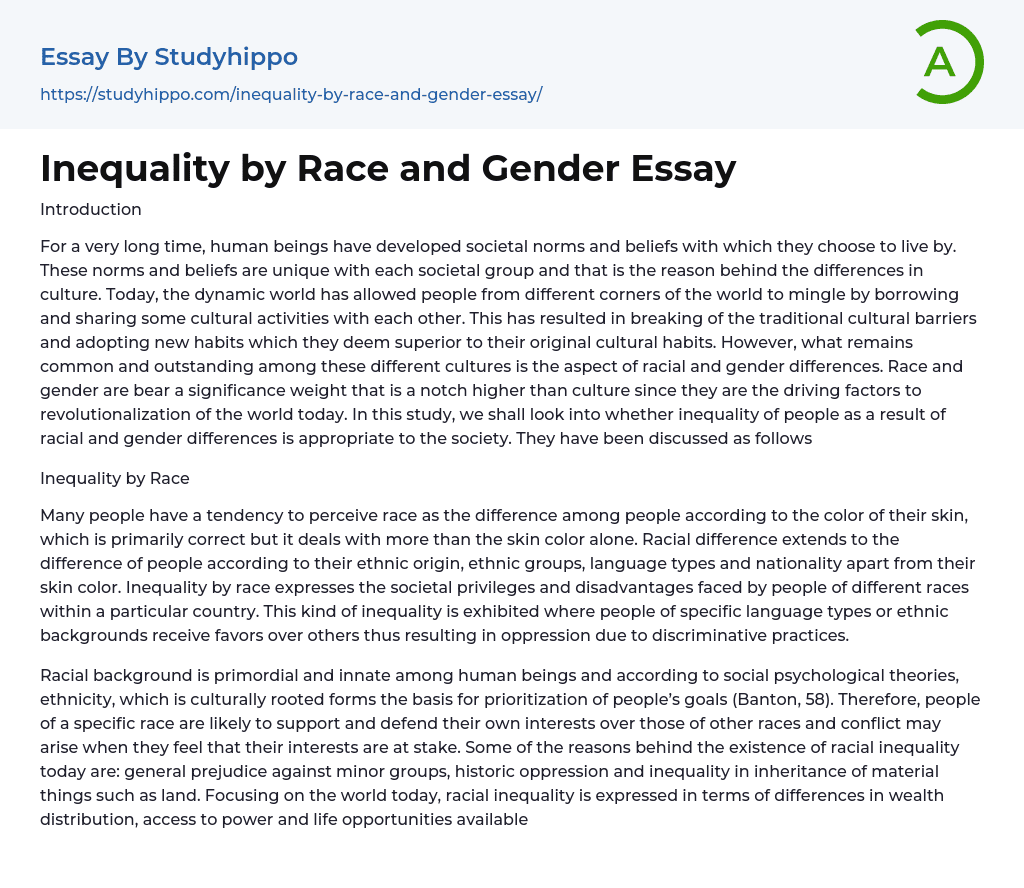Introduction
For a very long time, human beings have developed societal norms and beliefs with which they choose to live by. These norms and beliefs are unique with each societal group and that is the reason behind the differences in culture. Today, the dynamic world has allowed people from different corners of the world to mingle by borrowing and sharing some cultural activities with each other. This has resulted in breaking of the traditional cultural barriers and adopting new habits which they deem superior to their original cultural habits.
However, what remains common and outstanding among these different cultures is the aspect of racial and gender differences. Race and gender are bear a significance weight that is a notch higher than culture since they are the driving factors to revolutionalization of the world today. In this study, we shall look into whe
...ther inequality of people as a result of racial and gender differences is appropriate to the society. They have been discussed as follows
Inequality by Race
Many people have a tendency to perceive race as the difference among people according to the color of their skin, which is primarily correct but it deals with more than the skin color alone. Racial difference extends to the difference of people according to their ethnic origin, ethnic groups, language types and nationality apart from their skin color. Inequality by race expresses the societal privileges and disadvantages faced by people of different races within a particular country.
This kind of inequality is exhibited where people of specific language types or ethnic backgrounds receive favors over others thus resulting in oppression due to discriminative practices. Racial background is primordial and innate
among human beings and according to social psychological theories, ethnicity, which is culturally rooted forms the basis for prioritization of people’s goals (Banton, 58). Therefore, people of a specific race are likely to support and defend their own interests over those of other races and conflict may arise when they feel that their interests are at stake. Some of the reasons behind the existence of racial inequality today are: general prejudice against minor groups, historic oppression and inequality in inheritance of material things such as land. Focusing on the world today, racial inequality is expressed in terms of differences in wealth distribution, access to power and life opportunities available to people.
A current ongoing racial activism slogan/movement is the ‘Black Lives Matter’ which comprises the African-American communities campaigning against racism and violence towards black people (Edwards, 5). To add, there exists the Ku Klux Klan in the US, an organization which champions for supremacy of the white people and mainly focusing its discrimination toward the black community (Alexander, 7).
Inequality by Gender
Gender refers to the masculinity or the femininity of an individual. According to the functionalist perspective, gender roles are present in order to maximize the social efficiency (Mouzelis, 35). Gender inequality addresses the discrimination against people due to differences in their sexuality.
For precision, sexism best supplements gender inequality since it holds the belief that there are behavioral, psychological and intellectual differences which are innate between men and women which express the superiority of one gender against the inferior other (Ronai et al, 23). As a result, there exists groups of people who value masculinity over the feminism and vice versa. This causes conflict between
parties of each gender, some of which have gained both national and international recognition. Theoretically, inequality by gender focuses on oppression against both genders, in reality, this topic has been mostly single-sided, meaning that it mostly circulates around discrimination against girls and women rather than boys and men.
The society as well as executive laws today are in favor of the female gender thus leaving the boy child endangered. For instance, a woman’s plea in court for justice against rape violations towards her would be prioritized over a man’s plea over the same case in court. Inequality by gender is exhibited in some groups and organizations worldwide where leadership posts and certain job types are specifically dedicated to people of a specific gender. For example, it is rare to find CEO’s in companies being ladies while it is common to find secretaries in organizations and nurses in hospitals being of the female gender. Globally, there is no country where men and women have equal status, however, strategies are in place to minimize the gender gap in the healthcare, education, employment and the government among other sectors.
Conclusion
To conclude, inequality of people as a result of racial and gender differences is inappropriate to the society.
People have to learn to accept themselves according to their gender and racial statuses. Once this is done, it will be possible to recognize and accept other genders and racial types in the world so as to develop ways in which they can correlate and promote stability and solidarity. At some point in time, there will be an urgent need for the world to combine its resources and capabilities and that means
that societal barriers such as inequality against gender and race will have to be overlooked in order to foster massive innovation.
Works Cited
- Alexander, Charles C. The Ku Klux Klan in the Southwest. University Press of Kentucky, 2015. Print
- Banton, Michael. Ethnic and racial consciousness. Routledge, 2014. Print.
- Edwards, Sue Bradford. Black Lives Matter. ABDO, 2016. Print
- Howard, Eve L. Classic readings in sociology. Wadsworth, 2002. Print.
- Mouzelis, Nicos. Sociological theory: what went wrong?: Diagnosis and remedies.
Routledge, 2003. Print
- Omi, Michael, and Howard Winant. Racial formation in the United States. Routledge, 2014. Print.
- Ronai, Carol Rambo, Barbara A. Zsembik, and Joe R.
Feagin. Everyday sexism in the third millennium. Routledge, 2014. Print
- Schaefer, Richard T. "Sociology matters." 2009. Print




